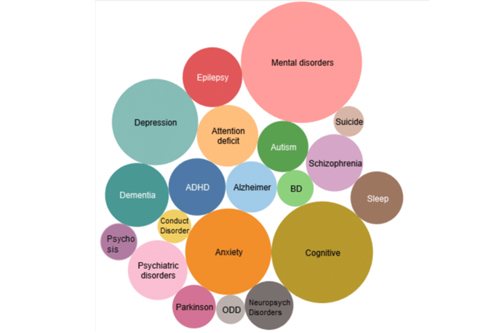
Cognitive disorders In Nagpur! Cognitive disorders include dementia, amnesia, and delirium. Patients in such conditions may lose full orientation to time and space. The diagnosis of such disorders could be transitory in the case of delirium or progressive as in dementia like Alzheimer’s disease.
Disease is a contributing factor to all cognitive disorders. However, treatments for the disorders are symptomatic rather than curative and tailored to every specific diagnosis. Ongoing research seeks to the further our understanding of the underlying causes of a cognitive disorders and help improve treatment strategies.
What Are Cognitive Disorders?
Cognitive disorders refer to conditions that affect cognitive functions such as memory, learning, problem-solving, and decision-making. These disorders range from mild cognitive impairment (MCI) to severe conditions like Alzheimer’s disease and dementia.
Cognitive disorders are a growing concern in today’s fast-paced world, affecting individuals of all ages. These disorders impair an individual’s ability to think, remember, and reason, significantly impacting daily life. In Nagpur, the rise in cognitive impairments has led to an increased need for specialized medical attention. Fortunately, the city offers some of the best neurology and psychiatry facilities for diagnosing and managing cognitive disorders.
In this comprehensive guide, we will explore everything about cognitive disorders in Nagpur, including their causes, symptoms, diagnosis, treatment options, and the best specialists available. If you or your loved ones are experiencing memory loss, confusion, or difficulty in problem-solving, this article will provide valuable insights into seeking the right care.
Common Types of Cognitive Disorders
- Alzheimer’s Disease – A progressive neurological disorder can causes memory loss and cognitive decline.
- Dementia – A general term for cognitive decline that interferes with daily life.
- Mild Cognitive Impairment (MCI) – A stage between normal aging and dementia where individuals experience noticeable cognitive decline but can still function independently.
- Parkinson’s Disease Dementia – A form of dementia that occurs in people with Parkinson’s disease.
- Traumatic Brain Injury (TBI) – Brain dysfunction caused by an external force, such as a severe blow to the head.
- Vascular Dementia – Cognitive decline due to reduced blood flow to the brain.
- Lewy Body Dementia – A progressive condition that affects thinking, movement, and alertness.
- Huntington’s Disease – A genetic disorder affecting motor function and cognition.
Symptoms of Cognitive Disorders:
-
- Memory loss (short-term or long-term)
- Difficulty concentrating or paying attention
- Poor judgment and decision-making
- Disorientation (to time, place, or person)
- Difficulty with language (e.g., finding words, understanding speech)
- Changes in mood or behavior
- Difficulty with planning or carrying out tasks
- Hallucinations or delusions (in some forms of dementia)
Causes of Cognitive Disorders:
- Neurodegenerative Diseases: Conditions like Alzheimer’s disease, Parkinson’s disease, and Huntington’s disease lead to progressive brain damage.
- Vascular Issues: Reduced blood flow to the brain, such as from strokes, can cause cognitive decline.
- Brain Injury: Trauma to the brain from accidents or head injuries can result in cognitive impairment.
- Infections: Certain infections, like encephalitis or HIV, can damage brain tissue and affect cognition.
- Substance Abuse: Long-term alcohol or drug use can lead to cognitive deficits.
- Nutritional Deficiencies: Deficiencies in vitamins, especially thiamine (B1), B12, and folate, can cause cognitive decline.
- Medications: Some medications, particularly sedatives, and anticholinergic drugs, can impair cognition, especially in older adults.
Treatment and Management:
- Medications: Cholinesterase Inhibitors: Used in Alzheimer’s disease to improve communication between nerve cells (e.g., donepezil, rivastigmine). NMDA Antagonists: Memantine may help moderate-to-severe Alzheimer’s patients by the regulating glutamate activity. Medications for Underlying Conditions: Treating infections, strokes, or nutritional deficiencies can sometimes reverse or improve cognitive function.
- Cognitive Rehabilitation: Programs that focus on improving memory, attention, or problem-solving skills through cognitive exercises or strategies.
- Lifestyle Modifications: Healthy diet, physical exercise, social engagement, and mental activities (e.g., puzzles, reading) may slow cognitive decline. Managing cardiovascular risk factors (e.g., hypertension, diabetes) can prevent further cognitive impairment, especially in vascular dementia.
- Psychotherapy and Support: Cognitive-behavioral therapy (CBT) can help patients cope with the emotional impact of cognitive disorders. Support for caregivers is also crucial as these conditions are often challenging for families.
- Assistive Devices: Memory aids, calendars, and other tools can help patients manage daily activities and remain independent longer.
Diagnosis of Cognitive Disorders in Nagpur
Diagnosing cognitive disorders involves a combination of medical history evaluation, cognitive tests, and brain imaging. Nagpur has several well-equipped hospitals and clinics offering cutting-edge diagnostic techniques.
- Cognitive and Neuropsychological Tests – Assess memory, reasoning, language, and judgment.
- MRI and CT Scans – Detect abnormalities in brain structure.
- Electroencephalogram (EEG) – Measures electrical activity in brain.
- Blood Tests – Identify vitamin deficiencies, infections, and thyroid issues.
- Spinal Tap (Lumbar Puncture) – Checks cerebrospinal fluid for infections and abnormalities.Contact Us
Conclusion
Cognitive disorders significantly impact the quality of life, but early diagnosis and proper treatment can make a difference. If you or a loved one is experiencing cognitive decline, seeking medical advice from the best neurologists in Nagpur is the first step toward effective management. With advanced medical facilities, experienced professionals, and supportive care programs, Nagpur is well-equipped to handle cognitive disorders and improve the well-being of affected individuals.Schedule your Consultation with Dr. Ritesh Nawkhare
